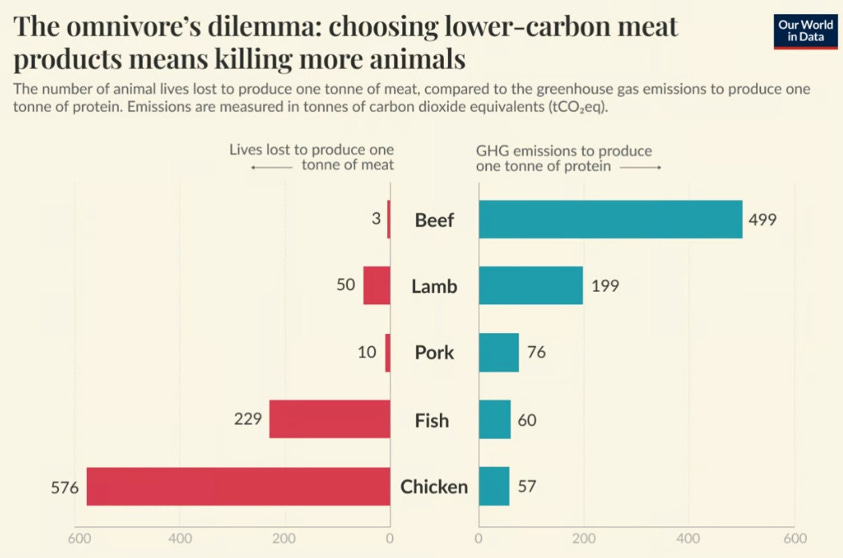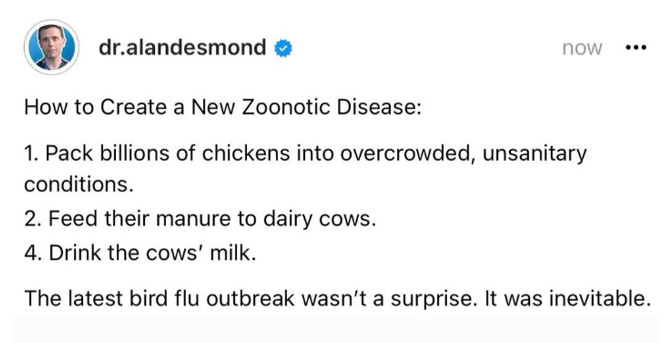Sometimes, it is enough to be awake and look around – the symptoms are in plain sight. The world is burning and we take out the popcorn to enjoy the scene. Just that it’s not popcorn, but beef jerky and chicken nuggets.
My moment of realisation occurred during a meal break at work. For context, the employer offers us free lunches every day and my colleagues are educated, internet-savvy and overall kind people. It is difficult to imagine a better setting for making a moral choice. Choosing a meat-free option literally takes one extra click, and that’s only if you want to filter by diet when ordering the meal. And yet, most people opt for meat.
That is it – no more effort than one click. All the animal products come from CAFOs, so a plant-based choice would be better for the environment, for human health and for the animals themselves. My colleagues are not uniformed; they are not dumb or bad people. Besides a few trolls (every workplace has them), they to care where their food comes from. But when the choice is between a meat dish from God knows where and a plant option, why opt for the former?
This is a widespread issue – most people do not like intensive farming and yet they buy from the industry. Even bright, kind people can make choices contrary to their values every day. It may not be easy to draw the line between individual and collective moral responsibility. But it’s certain that we eat our way into extinction.
Many facts, few feelings
‘Surely eating meat is not the most likely to bring societal collapse soon!’ That’s right; while animal agriculture is one of the biggest polluters, fossil fuels stain more. From a different perspective, the technology for war becomes increasingly scary. Good luck trying to fight against big oil companies or convincing dictators to care about morals! Those people control entire countries; you barely own a fork. But the way we use our forks matters!
While there is serious progress when it comes to combating global warming, it is not enough. As we say in Romania, 'un pas înainte și doi înapoi.' That is, we make one step ahead and two backwards. A move away from fossil fuels is good, but unless we reform animal ag, we may very well end up eating our way into collapse nonetheless. This is not only a ‘vegan’ or ‘animal ethics’ issue but a human one too! Producing so much meat is a leading cause of deforestation, wastes a lot of resources (water, land) and creates undesirable jobs in slaughterhouses, farms or meat-packing plants that are usually filled by poorer people, often male and immigrants.
(If you’re worried about job loses, AI is a much bigger threat than a green future. Also, as Norway recently showed when they banned fur-farming, such changes can happen while making sure that the owners of the farms and workers are compensated and given other jobs.)
Eating meats that pollute less is not a fully viable solution either. That’s because it means breeding and killing more animals, which, it goes without saying, is not particularly fun for the animals. But more animals crammed into intensive farms also increase public health risks, such as pandemics like COVID or bird flu. We can throw antibiotics at the issue, but this only gets us so far – antibiotic resistance is already a big issue.

The fluff and the peril
The short paragraph from above may feel too abstract, so let’s look at concrete examples. Take cows, which are not only Instagram-friendly grass puppies but also the loveliest animals I have worked with as a shepherd in the past. Well, in New Zealand, for a human population of 5 million, there are five times more sheep and almost two times more cows. This may not sound like much, but a grisly titled report (Faecal indicator bacteria at recreational bathing sites) showed that:
‘During the 2022/23 bathing season, 82.3% of monitored river swimming sites, 60.0% of beach sites and 47.5% of lake sites were unsafe to swim at on at least one occasion.
In the 2022/23 bathing season, 32.5% of monitored river swimming sites, 7.3% of beach sites and 1.7% of lake sites were frequently unsuitable for swimming, with 20.0% or more of routine monitoring results showing they were unsafe to swim.’
So while a few cows or sheep in a village are cute, rearing millions will make it so that you have to think twice before doing basic things in nature, like taking a swim!
For another example, we are literally feeding hundreds of millions of tonnes of grain to factory-farmed animals instead of using it to solve food shortages for humans! Even worse, almost 25% of the animals raised on factory farms are never actually eaten - more than 18 billion chickens, cows, pigs and other livestock die yearly for nothing; their meat never reaches our plates. ‘Intensive livestock production uses about a third of the world’s grain, and two thirds of soy, maize and barley, undermining global food security.’ (Source.) Now, perhaps prefer fish to soy or barley. Tough luck; about half of the wild-caught fish is fed to fish in aquaculture and animals on farms, thus increasing prices and thus leading to more waste, higher prices and food insecurity.
How are we fine with such waste happening before our very eyes and who profits from it? Or are we just too dumb to manage foodstuff in a way that is sustainable, ethical and still profitable? Perhaps there are no easy answers to these questions. But until we figure out some solutions, let’s do our part by eating more plant-based foods (or wild-caught fish directly, for those who need it) instead of anything coming from a factory farm!

Workers of the world… relax.
As sad as this may sound, unless there is a strong religious prohibition against the eating of meat (India) or laws enforcing ethical farming (there is a big push for that in the EU), most people simply do not care where their protein comes from. Even worse, they are not entirely to blame for that.
Let’s face it, a reason the world is so messy nowadays has to do with work-life balance. People are too tired, brutalised or burnt out to care about moral issues that do not have an immediate negative effect on their lives. If you work in a factory, a busy restaurant or an office, you likely know what I mean. For ten, twelve or even more hours a day (if we include commuting) you have to work hard, often earning little more than survival money. If you want to keep on, you’ll usually have to give up your physical or mental health. Sometimes even both! I don’t know how to fix this and convince the powers that be to exploit people less – for starters, we may consider lowering the weekly hours of work, addressing the issue of bullshit jobs and allowing ourselves to do nothing from time to time. But we still have a choice when it comes to what we put in our… plates.
About work-life balance, see:
Like a Breath of Fresh Air! Zom 100 and the Philosophy of Possibility (Pt. 1)
The hero of Zom 100 manga and anime is so overworked that even a zombie apocalypse sounds more interesting than his daily routine! So too, many of us cannot imagine a better world. No wonder we already live in the cyberpunk. See more here.
Why look at the bad side of things?
Perhaps I should see the full half of the glass more often. After all, not everyone is frightened by the prospect of civilisational collapse. And I don’t mean terminally online trolls or accelerationist oligarchs, who’d rather see the world burn than do anything nice for once. I mean people like philosopher David Benatar, who argues that extinction is not something we should regret in itself, but rather the process leading towards it, because it will cause considerable suffering and death. In another place, he wrote that ‘the question is not whether humans will become extinct, but rather when they will.’
No matter if you eagerly await or rather dread the prospect of such a future, there are good reasons for us to reconsider the way we treat animals: caring about the well-being of future generations and buying products from factory farms are dissonant; conversely, do we really want to race towards collapse with our hands full of blood, instead of enjoying our lives in a more peaceful way? As the only species that can be moral, there is no one but us who can do it. We literally choose to live in the cyberpunk instead of doing everything we can to actually bring about a solarpunk.
And maybe, if we manage to change one thing, it will help us become better people overall. I, for one, was a shepherd in the past, but choosing a vegan lifestyle was not an end in itself. In fact, it was after this that I became more compassionate and understanding of other humans too. Of course, kindness towards animals is not the answer to everything, but it is a good start.
You can send your feedback, questions or opinion about the article to the email address counting.emails.not.sheep@gmail.com, on reddit or Instagram.
Everyone has a support profile nowadays, so I made one too. Click here if you feel like buying me a coffee :)







You're right to focus on the damaging effects of *industrially* raised animal products.
But it need not be that way.
First off, "animal products" is often attacked as if it were a single thing. There's at least two dimensions to consider: the lifetime of the animal, and whether industrial farming techniques are used.
Dairy and eggs are often produced using industrial techniques, and in this way, will have a similar ecological footprint with industrial meat.
But dairy, eggs, and even meat *can be* produced in a sustainable manner, in a way that does not use much grain or land that could be used to directly fed people.
For example, my dairy goats were grazed in a forested area, unsuitable for growing annual food crops. Not only that, but they produced eight cubic metres of high-quality fertilizer every year, which we then put on our garden and greenhouse beds.
Vegan agriculture is often held forth as an Earth-superior way of producing human food. But in an industrial agriculture setting, the land will wear out, unless either chemical fertilizer or animal manures are applied — which is not really vegan any more, is it?
The vegan alternative of fallowing requires that a cover crop be ploughed in, without harvesting anything, one out of four years, thus reducing the land's productivity by 25%.
So in general, I find the notion faulty that not eating meat, per se, is more "Earth friendly" than producing animal products — especially ones that don't kill the animal, like dairy or eggs.
Using Permaculture techniques, livestock are integrated into the ecosystem in ways that do not reduce sustainability, indeed, in ways that enhance sustainability.